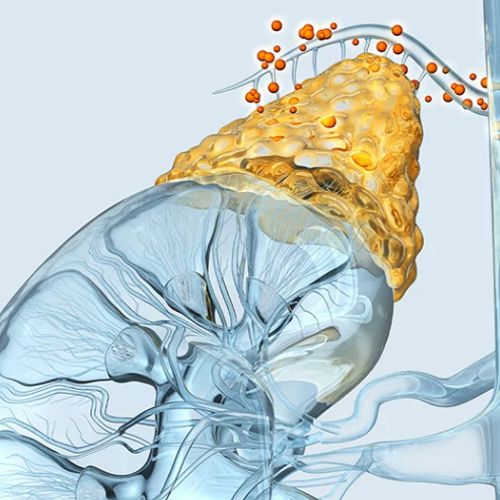Your adrenal glands, small organs perched atop your kidneys, play a crucial role in managing your body's response to stress. In today's demanding environment, these vital glands can become overtaxed, potentially leading to a range of health challenges.
Understanding Adrenal Health and Stress
The adrenal glands produce essential hormones, including cortisol, which help regulate stress responses. When life's pressures become relentless, these glands work overtime, potentially leading to a state of chronic stress. This constant state of high alert can manifest as fatigue, sleep disturbances, and even unexplained weight fluctuations.
When adrenal glands are overworked and unable to produce adequate hormone levels, various symptoms may indicate this imbalance. Common signs include:
Persistent fatigue, even after a full night's sleep
Difficulty falling asleep or staying asleep
Unexplained weight gain or loss
Intense cravings for salty or sweet foods
Reliance on caffeine or stimulants to get through the day
Feeling overwhelmed or unable to cope with stress
Low energy levels, especially in the morning and mid-afternoon
Brain fog or difficulty concentrating
Low blood pressure or dizziness when standing up quickly
Mood swings or irritability
Understanding and supporting adrenal health through balanced nutrition, adequate rest, and stress management techniques can help restore proper hormone function and improve overall well-being.
Nutritional Support for Adrenal Health
A well-balanced, nutrient-rich diet forms the foundation of supporting your body's stress management capabilities. Here are key nutritional strategies to nourish your adrenals and promote overall wellness:
Blood Sugar Balance: Stabilizing blood sugar levels is crucial for adrenal health. Incorporate complex carbohydrates, lean proteins, and healthy fats in each meal. Foods like quinoa, lentils, wild-caught salmon, and avocados can help maintain steady energy levels throughout the day.
Vitamin C Powerhouses: The adrenal glands house one of the body's highest concentrations of vitamin C. Boost your intake with bell peppers, kiwi, Brussels sprouts, and leafy greens to support optimal adrenal function.
B-Complex Vitality: B vitamins are essential for energy production and stress management. Include grass-fed beef, eggs, nutritional yeast, and leafy greens to ensure a robust B vitamin profile.
Magnesium Magic: Stress often depletes magnesium levels. Replenish this vital mineral with dark chocolate, spinach, pumpkin seeds, and almonds.
Adaptogenic Allies: Adaptogenic herbs can support the body's stress response. Ashwagandha, rhodiola, and holy basil are popular choices. Always consult a healthcare professional before adding these to your regimen.
Hydration Harmony: Proper hydration is crucial for overall health, including adrenal function. Aim for at least 8 glasses of water daily, and consider calming herbal teas like chamomile or lemon balm.
Nutrition's Role in Stress Management: Recent Findings
A study published in BMJ in 2020 titled "Food and mood: how do diet and nutrition affect mental wellbeing?" highlights the significant impact of diet on mental health. Researchers found that poor nutrition may contribute to low mood, while a healthy diet can improve both physical and mental health. They emphasize that the Mediterranean diet is linked to better mental health compared to the Western diet.
The Mediterranean diet stands out due to its high consumption of fruits, vegetables, nuts, legumes, whole grains, and healthy fats, particularly olive oil. It also includes moderate consumption of fish and poultry, while red meat and processed foods are limited. This diet is rich in antioxidants, fiber, and essential nutrients that support overall health.
In contrast, the Western diet is often high in refined sugars, unhealthy fats, and processed foods, which can lead to inflammation and poor gut health. These dietary habits can negatively impact mental wellbeing, contributing to conditions such as depression and anxiety.
The Mediterranean diet’s emphasis on whole, unprocessed foods helps to stabilize blood sugar levels, reduce inflammation, and promote a healthy gut microbiome. By supporting these bodily functions, this diet can effectively reduce stress and enhance overall mental resilience. Learn more about it here.
Beyond the Plate: A Holistic Approach
While nutrition plays a pivotal role in supporting adrenal health, it's just one aspect of overall wellness. Regular exercise, quality sleep, and stress-management techniques like meditation or deep breathing exercises are all crucial components of a comprehensive approach to managing chronic stress. Here are a few practical tips to get started:
Balanced Diet: Incorporate more fruits, vegetables, nuts, legumes, whole grains, and healthy fats into your meals.
Exercise: Aim for at least 30 minutes of moderate exercise most days of the week.
Sleep: Prioritize 7-9 hours of quality sleep each night by maintaining a consistent sleep schedule.
Stress Management: Practice daily meditation, yoga, or deep breathing exercises to help reduce stress levels.
By focusing on a nutrient-dense diet and adopting a holistic approach to wellness, we can support our body's natural stress response mechanisms and promote overall vitality.
If you're experiencing persistent fatigue or other concerning symptoms, it's important to consult with a holistic nutritionist for a proper evaluation. A practitioner with a holistic approach will see your body as a whole, considering how different systems and lifestyle factors interact. This comprehensive perspective is essential for addressing the root causes of your symptoms and creating a tailored plan that promotes overall well-being. Nutrition is a powerful ally in supporting our health, and when approached holistically, it can lead to more effective and lasting results.
By nurturing your adrenals through mindful nutrition and lifestyle choices, you can enhance your body's resilience to stress and pave the way for improved overall health and well-being. Remember, small, consistent steps towards better nutrition and stress management can lead to significant improvements in your quality of life. Embrace these changes with optimism, knowing that you're taking proactive steps towards a healthier, more balanced you.













